Sandy Bridge Memory Scaling: Choosing the Best DDR3
by Jared Bell on July 25, 2011 1:55 AM ESTMemory Scaling with Overclocking
What happens when we increase the CPU clock speed on our Core i7-2600K from the default 3.5GHz to 4.8GHz; how will that affect memory performance? To find out, I ran the memory bandwidth tests again comparing DDR3-1333 CL9, DDR3-1600 CL9, and DDR3-2133 CL9 at both 3.5GHz and 4.8GHz CPU clock speeds. I also ran the most bandwidth intensive real-world test along with the least bandwidth intensive real-world test at the overclocked CPU speed to see if the faster CPU clock speed made any difference here as well.
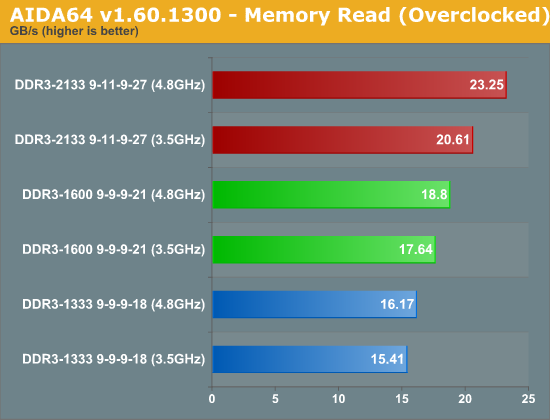
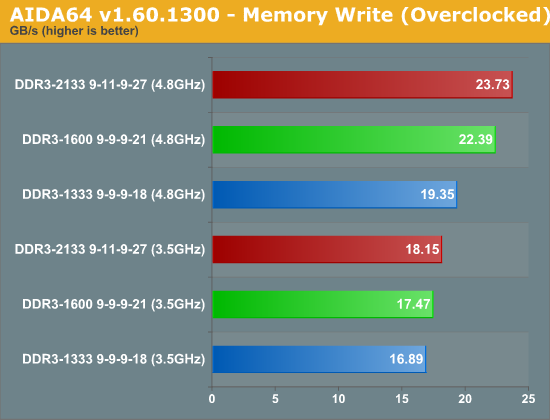
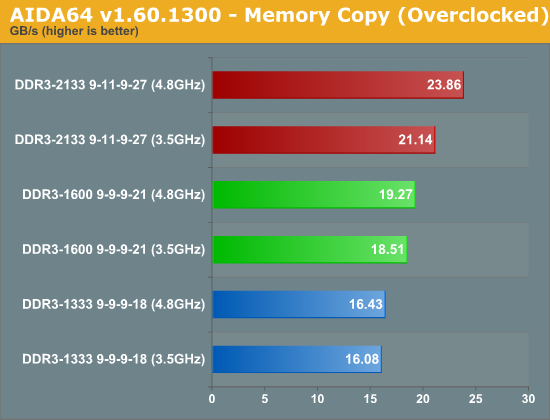
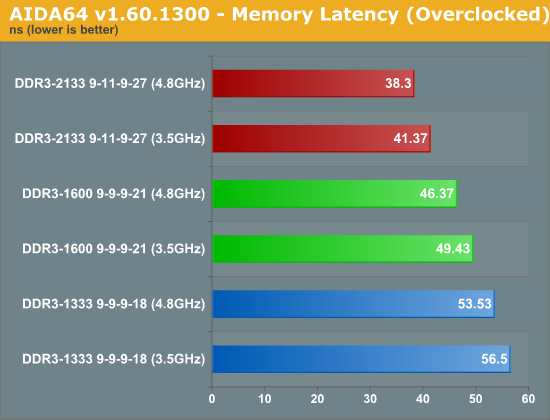
The AIDA64 memory benchmark shows that memory bandwidth does scale with CPU clock speed. Going from DDR3-1333 to DDR3-1600 showed a 14% boost on our stock CPU while showing a 16% boost on our overclocked CPU. Stepping up from DDR3-1333 to DDR3-2133 saw a 33% increase on the stock CPU and a 43% increase on our overclocked CPU. The copy and latency tests showed similar results. What's more impressive is that the write test showed a much larger 15% increase from DDR3-1333 to DDR3-1600 on the overclocked CPU compared to 3% on the stock CPU. Going from DDR3-1333 to DDR3-2133 increased write performance by 22% when overclocked compared to 7% when stock. While it's interesting to see how an overclocked CPU affects raw memory bandwidth, I'm much more interested to see how it affects our real-world benchmarks.
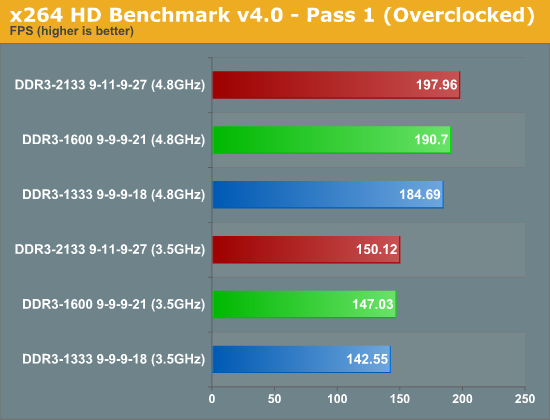
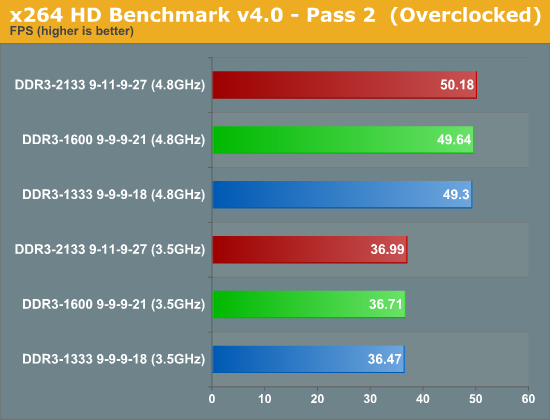
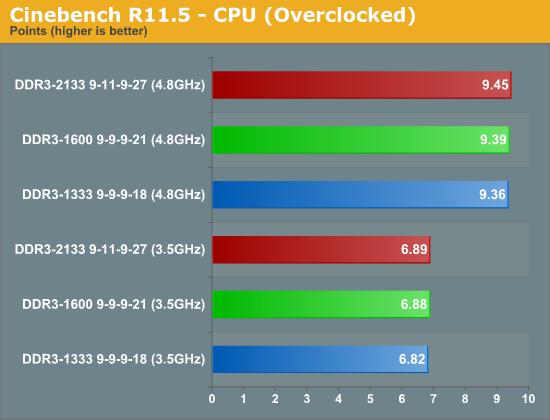
The extra bandwidth gained with the overclocked CPU doesn't exactly translate into much. The first pass of the x264 test reveals a 7% advantage for DDR3-2133 over DDR3-1333 on our overclocked CPU while the stock CPU shows a 5% increase. The increase for DDR3-1600 over DDR3-1333 is 3% for both our overclocked and stock CPUs. Once we move on to the second pass, there's no discernible advantage for faster memory on our overclocked system. The Cinebench test results are every bit as unimpressive with overclocking as at stock: overclocked or not, faster memory makes no real difference (though the faster CPU clock speed definitely helps a lot).










76 Comments
View All Comments
Rick83 - Monday, July 25, 2011 - link
Do they take into account, that we should be using 1.5V DIMMs for Sandy Bridge?The addition of that requirement usually limits choice quite a bit.
compudaze - Monday, July 25, 2011 - link
The SNB datasheet does suggest that the max memory voltage is 1.575V, however, many motherboard and memory manufactures state that they haven't had any problems with memory running at 1.65V on SNB.compudaze - Monday, July 25, 2011 - link
Also, if you stick to the spec sheet, you shouldn't be running faster than DDR3-1333 memory.Taft12 - Monday, July 25, 2011 - link
You should be using 1.5V DIMMs anyway - if a memory OEM needs 1.65V to achieve the same speed and timings another vendor does at 1.5V, it's inferior memory.jdogi - Monday, July 25, 2011 - link
Just as your daily driver vehicle is likely inferior to a Mercedes or Ferrari. You should get a new car. You should not make any attempt to balance cost with the value. Just get the best. It's the only way to go. What's best for Taft is best for all.;-)
Iketh - Tuesday, July 26, 2011 - link
you didn't understand the logicMrSpadge - Wednesday, July 27, 2011 - link
I'm sure he did. What Taft failed to mention was that "at the same price, you should be using the memory spec'ed for less voltage". However, if some memory needs a little more voltage, but is way cheaper - balance cost and value.MrS
Rick83 - Wednesday, July 27, 2011 - link
Actually, the higher voltage is out of spec for the CPU memory controller and may wel impact longevity.So it's like buying the Ferrari, and running it on Biofuel with too much Ethanol that eats right through the tubing, but is marginally cheaper.
jfelano - Tuesday, July 26, 2011 - link
Not inferior, just older. All 1600mhz memory was 1.65v when it debuted. Then they came out with 1.5v, now even 1.35v.cervantesmx - Thursday, July 28, 2011 - link
That is correct indeed. Just purchased 8GB at 1600mhz running on 1.25v. $59.99. Free shipping.